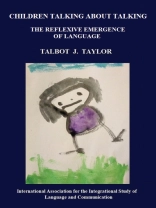Talbot Taylor argues that in the child’s acquisition of language the distinctively linguistic identity of language emerges only gradually, by means of the child’s increasingly competent participation in the scaffolded discursive processes of reflexive enculturation. The papers included here explore the implications of this argument for research on developmental linguistics, metalinguistic discourse, sociocognitive development, ecological psychology, the enactive philosophy of mind, and the philosophy of language.
关于作者
Talbot J. Taylor is the Louise G. T. Cooley Professor of Linguistics at William & Mary. He is the author of Theorizing Language (1997) and Mutual Misunderstanding (1993) and co-author of Landmarks in Linguistic Thought (vol. 1, 1997; vol. 2, 2001) and Apes, Language, and the Human Mind (1998). His journal articles and book chapters since 1980 have addressed issues in linguistic normativity, reflexive and metalinguistic practices, child language development, integrational linguistics, conversation analysis, ape language research, the ontology and epistemology of linguistic research, linguistic historiography, and the language ideas of Ludwig Wittgenstein.












